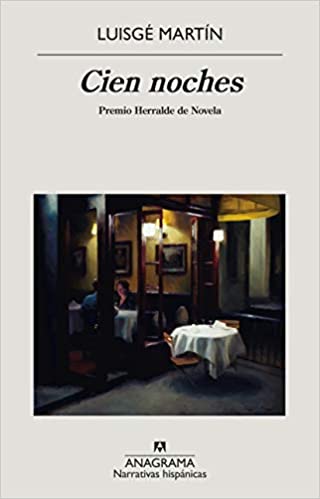In the Madrid writer Luisgé Martin we discovered one of those original storytellers out of sheer determination. His novels and essays connect with that fatalistic vision of everything. A lucidity, with its sinister point, in front of which there is no other than to overcome and go out to split the face with destiny. Let's call it destiny or whatever it is that moves us like a priceless inertia in the already colossal march of the universe.
Why bring here that contrast between our smallness and the cosmos? Well, because deep down it's a bit of that, deep down existentialism made intrahistory by writers like Martín; in the thought overturned with rage; and even in the outlining of characters who wander through life with their inconsequential claims, we nevertheless discover a wonderful contrast. And it is that despite everything we are still alive. Even not having the remotest idea of anything, we continue with that attitude of civilization capable of everything, self-sufficient, close to the divine ...
The matter awakens a point of hilarity with an echo that ends up freezing the soul. In the development of many scenes from the novels by Luisgé Martín It is a discovery of the trick of living for the reader, a return to the child who contemplates the Emperor naked and who is capable of awakening everyone from the alienating unconsciousness. Later we will return again to our inertia, to self-inflicted naivety as survival. In the meantime, let's enjoy good literature.
Top 3 recommended novels by Luisgé Martín
One hundred nights
From Mariana Enriquez, the next to get hold of it Herralde novel award 2020 edition was Luisgé Martin with this novel. Novels of one and the other that confirm this award as one of the most regarded for the cause of great literature. Because each new award-winning work always leads us to that terribly serene shore, where the echoes of the great narratives break.
One hundred nights is one moral fable with detective and scientific traces that inquires into love and infidelity. An erotic and black novel that explores the forms that lies take.
About half of human beings confess to being sexually unfaithful to their partner. But does the other half tell the truth or lie? There is only one way to prove it: to investigate his life through detectives or electronic means of espionage. This is the anthropological experiment that this novel proposes: to investigate without their consent six thousand people to finally elaborate a reliable statistic of the sexual behaviors of our societies.
Irene, its protagonist, seeks in sexuality the secrets of the human soul. As a young man, he traveled from Madrid to Chicago to do his university studies in Psychology, and there, far from his family, he began to analyze almost scientifically the men he came across and with whom he went to bed. Her cold gaze as a researcher changes when she falls in love with the Argentine Claudio, who carries a painful secret with him and whose family has a dark past linked to the history of his country. One hundred nights it is at the same time a novel of sentimental reflection, erotic investigation and police pursuit of a murderer who has not left any trace of his crime.
En One hundred nights The different forms of love - some radical and extreme - and the various sexual behaviors - some equally radical and extreme - are explored; Act of loyalty, infidelity, unspeakable desires, taboos, half-truths and deceptions that surround our relationships are drawn up. There is talk of masks and lies. And as a game, a series of adultery files are incorporated that the author requested from the writers Edurne Portela, Manuel Vilas, Sergio del Molino, Lara Moreno and José Ovejero, in a stimulating exercise of literary promiscuity.
Love upside down
The right side of things. Kind of like putting your sock on with the seam facing inward, as it should be. They are the dictates of the right thing that also comes to love with its patterns. The majorities setting the pace, a sinister goose step with echoes of normality and integration. The adventure of going against the current is even more so in matters of love ...
Love upside down is the sentimental autobiography of a boy who, upon reaching adolescence, discovers that his heart is rotten by a malignant disease: homosexuality: «In 1977, at the age of fifteen, when I had the definitive certainty of that he was gay, I swore to myself, terrified, that no one would ever know. Like Scarlett O'Hara in Gone with the Wind, it was a solemn promise.
In 2006, however, I married a man in a civil ceremony before XNUMX guests, including my childhood friends, my fellow students, my work colleagues, and my entire family. In those twenty-nine years that had elapsed between one date and another, I had undergone a reverse metamorphosis to that of Gregorio Samsa: I had ceased to be a cockroach and had gradually become a human being. "
The reverse love is the story of a path of perfection that tries to expose, without clichés and without moralisms, the naked intimacy of someone who suddenly feels separated from social norms and tries to survive among them. The author recounts his own life with a sometimes hurtful sincerity: the discovery of his sexual condition, the first youthful loves, the psychological problems derived from his maladjustment, the behavioral therapy that he carried out to change his sick inclinations, the exploration of sex, the first affective relationships, contacts with the gay world and the progressive and late discovery of happiness, "the exact value of tenderness."
It is also the portrait of a society infected by intolerance and prejudice, which seeks imaginary diseases to mark its own moral territory. Until now Luisgé Martín had been filtering details of his biography in his novels. In this book, he turns his own life into the narrative, exemplary in the classic sense of the term: it serves to glimpse through it the weaknesses and greatness of human nature; his miseries, his ambitions and his achievements.
The result of their efforts is a work of overwhelming frankness and exceptional literary quality that recalls decades of masks, groping and explorations, on a first painful and then liberating journey towards self-knowledge. An intimate portrait without veils, a portentous contribution to autobiographical literature.
The Shadow Woman
Sexual filias can be approached with frivolity, to pose them as a slight sample that slightly bristles the skin to the touch, or it can be offered as a strong liquor to be tasted to the depths of its flows. Luisgé Martín pays for the round so that we can drink frenziedly from extreme passions, from arriving at that point where the pleasure reaches to frighten the pain because there is nothing left beyond the unbridled enjoyment.
A few days before dying in an accident, Guillermo confesses to his friend Eusebio that he has sadomasochistic sexual relations with a mysterious woman. At the end of time, and by chance, Eusebio decides to look for that woman to tell her that Guillermo has died and that therefore he will never call her again. And when he finds her, he is enchanted by her. He dares not say anything to her so as not to have to reveal the secrets he knows, so as not to scare her away.
Little by little they fall in love. Eusebio expects her to hit him, humiliate him, and abuse him sexually as she did with Guillermo, but Julia only caresses and caresses him. That is the beginning of the terrible doubt that finds its way into Eusebio's thoughts: are both the same woman? Are the one who lashed Guillermo with a whip and the one who quietly hugs him the same person?
The Shadow Woman is the story of an obsession and a path to hell. It is a novel about secrecy, about guilt and about identity. In it, Luisgé Martín once again investigates the darkest labyrinths of the human soul and paints those existential dilemmas in which heterodox sexual passions are so important, which are always on the border of all morality and all law.



